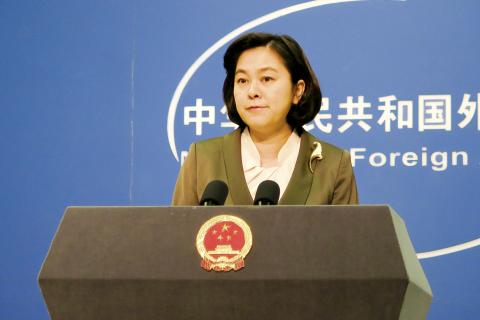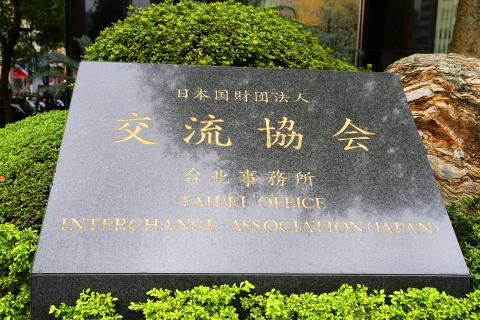The Ministry of Foreign Affairs yesterday expressed support for the planned renaming of the Interchange Association, Japan to the Japan-Taiwan Exchange Association from Sunday.
The association represents Japan’s interests in Taiwan in the absence of bilateral diplomatic ties, which ended in 1972. Taiwan also set up a de facto embassy with an ambiguous title in Tokyo, called the Association of East Asian Relations, which was renamed the Taipei Economic and Cultural Representative Office in Japan in 1992.
The ministry said that the new name reflects the business activities carried out by the association and is a positive development in Taiwan-Japan relations.

Photo: CNA
Saying that the two nations have become closer in recent years, the ministry added that Japan is Taiwan’s third-largest trade partner, while Taiwan is Japan’s fourth-largest. Bilateral trade totaled US$57.9 billion last year.
In addition, there were 5.3 million travelers between Taiwan and Japan last year and that number could surpass 6 million this year, the ministry said.
Taiwan and Japan share the universal values of democratic governance, freedom and the rule of law, with various public opinion polls showing the close and friendly relations between Taiwanese and Japanese, the ministry said, while expressing the hope that the two will continue to expand and deepen mutually beneficial cooperation.

Photo: CNA
The move could represent the greatest breakthrough since the foundation was established in 1972 after official diplomatic ties between the two nations were severed, and is expected to further Taiwan-Japan relations.
Former leader Chiang Kai-shek’s (蔣介石) administration proposed that the Japan-based association be named the Japan-China Interchange Foundation, which Tokyo rejected, anonymous sources said.
Like its Taiwanese counterpart, the then-Association of East Asian Relations, their vague appellations caused bafflement as to what their purposes were.
The sources said that the timing of the name change was because “times have changed,” which has manifested itself in several ways.
“In the 1980s and 1990s, there were not many substantial exchanges between Japan and Taiwan, but the total number of tourists visiting both nations has surpassed 6 million in recent years, and exchanges have been plentiful on a wide range of issues,” the sources said.
A recent survey by the Japanese government found that only 10 percent of Taiwanese respondents said they knew what “the functions of the Interchange Association, Japan, were, while 80 percent said the opposite, the sources said.
Association officials did not confirm if the name change signals a deepening of Taipei-Tokyo relations, but dismissed speculation that the move was inspired by US president-elect Donald Trump’s perceived stance on Taiwan, saying that it was planned, a source said.
A Japanese official said that it was “Taiwan’s business” if it changes the name of the Taipei Economic and Cultural Representative Office in Japan to the Taiwan Economic and Cultural Representative Office in Japan, but added that the potential political implications should be assessed before a change is made, the source said.
Japanese officials said that Taiwan submitted a request to change the representative office title during former representative to Japan Koh Se-kai’s (許世楷) term between 2004 and 2008, adding that the ministry has never made such a request.
“China remains firm and consistent on issues regarding Taiwan affairs. We strongly oppose any attempts at creating the frameworks of ‘one China, one Taiwan’ or ‘two China’s.’ We express our strong protest against Japan’s passive stance over Taiwan affairs,” Chinese Ministry of Foreign Affairs spokeswoman Hua Chunying (華春瑩) said at a news conference in Beijing in response to the proposed name change.
“China urges Japan to adhere to the principles set forth in the Japan-China Joint Communique and honor the promises it has made to China, uphold the ‘one China’ principle and refrain from sending false signals to Taiwan and the international community, thereby causing new problems to China-Japan relations,” she said.
China has initiated negotiations with Japan over the issue, she said.

CHAOS: Iranians took to the streets playing celebratory music after reports of Khamenei’s death on Saturday, while mourners also gathered in Tehran yesterday Iranian Supreme Leader Ayatollah Ali Khamenei was killed in a major attack on Iran launched by Israel and the US, throwing the future of the Islamic republic into doubt and raising the risk of regional instability. Iranian state television and the state-run IRNA news agency announced the 86-year-old’s death early yesterday. US President Donald Trump said it gave Iranians their “greatest chance” to “take back” their country. The announcements came after a joint US and Israeli aerial bombardment that targeted Iranian military and governmental sites. Trump said the “heavy and pinpoint bombing” would continue through the week or as long

TRUST: The KMT said it respected the US’ timing and considerations, and hoped it would continue to honor its commitments to helping Taiwan bolster its defenses and deterrence US President Donald Trump is delaying a multibillion-dollar arms sale to Taiwan to ensure his visit to Beijing is successful, a New York Times report said. The weapons sales package has stalled in the US Department of State, the report said, citing US officials it did not identify. The White House has told agencies not to push forward ahead of Trump’s meeting with Chinese President Xi Jinping (習近平), it said. The two last month held a phone call to discuss trade and geopolitical flashpoints ahead of the summit. Xi raised the Taiwan issue and urged the US to handle arms sales to

BIG SPENDERS: Foreign investors bought the most Taiwan equities since 2005, signaling confidence that an AI boom would continue to benefit chipmakers Taiwan Semiconductor Manufacturing Co’s (TSMC, 台積電) market capitalization swelled to US$2 trillion for the first time following a 4.25 percent rally in its American depositary receipts (ADR) overnight, putting the world’s biggest contract chipmaker sixth on the list of the world’s biggest companies by market capitalization, just behind Amazon.com Inc. The site CompaniesMarketcap.com ranked TSMC ahead of Saudi Aramco and Meta Platforms Inc. The Taiwanese company’s ADRs on Tuesday surged to US$385.75 on the New York Stock Exchange, as strong demand for artificial intelligence (AI) applications led to chip supply constraints and boost revenue growth to record-breaking levels. Each TSMC ADR represents

State-run CPC Corp, Taiwan (CPC, 台灣中油) yesterday said that it had confirmed on Saturday night with its liquefied natural gas (LNG) and crude oil suppliers that shipments are proceeding as scheduled and that domestic supplies remain unaffected. The CPC yesterday announced the gasoline and diesel prices will rise by NT$0.2 and NT$0.4 per liter, respectively, starting Monday, citing Middle East tensions and blizzards in the eastern United States. CPC also iterated it has been reducing the proportion of crude oil imports from the Middle East and diversifying its supply sources in the past few years in response to geopolitical risks, expanding